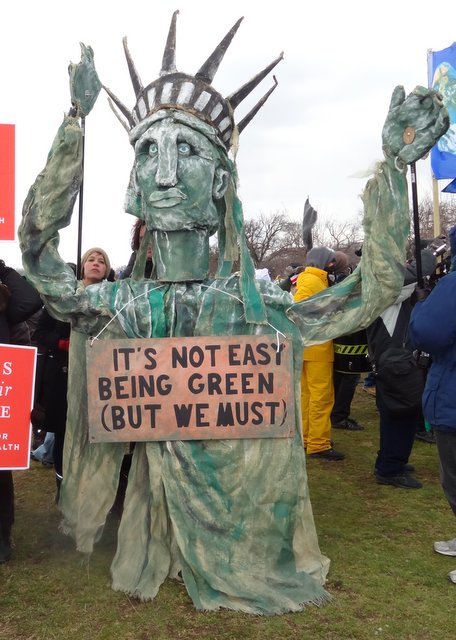Oak Park residents Jim Dickert, Kenneth O’Hare, and Mac Robinet participated in the February 17, 2013, rally and march in Washington, D.C. The event was organized by 350.org, the Sierra Club, and a number of other environmental groups, for the purpose of asking President Obama to deny the Keystone XL pipeline application of TransCanada Corporation. After twelve slow, blizzard-blinded hours on the road from Chicago, our Sierra Club-leased bus pulled up next to the Washington Monument. Fifty climate activists tumbled out into the bright, cold Sunday morning, in search of coffee. It was a diverse lot ideologically, united by the felt-sense that it is time to draw a line that says, “No!” to building more fossil fuel infrastructure.

A brisk walk back toward the Washington Monument, slipping through thickening crowds, brought us to the people united, never divided—35,000 or more strong, filling the entire space from the street on up to the monument itself, an emotional moment for everyone who has worked in relative isolation on the hard-to-organize, marginalized issue of climate change. Kindred spirits in countless numbers all around were raising the alarm.
The speakers were articulate, but it was hard to stand still in the cold. To keep warm, two of us circumnavigated the crowd, sloshing through half-frozen mud during Bill McKIbben’s welcome, Van Jones’ sharp challenge to the President to get going on climate, and the eloquent speeches of indigenous women from Alberta, who conveyed the graphic horror of the destruction of their home by tar sands mining.
The marchers stepped off about 1:00 p.m. We stayed near the front, following the yellow-jacketed marshals of the march, walking in good spirits with lots of seni ors, bright-eyed students, young parents with kids and strollers in abundance, the Flag, and cleverly funny signs across the whole range of climate and energy messages. Click for more pix…
ors, bright-eyed students, young parents with kids and strollers in abundance, the Flag, and cleverly funny signs across the whole range of climate and energy messages. Click for more pix…
Down Pennsylvania, past the bollards that permanently close the street in front of the White House to traffic, past the tall iron fence, then around the corner and away from the White House we walked. Everyone was exquisitely polite. “It’s the most mild-mannered march, I’ve ever been on,” said one older participant and veteran of other marches. Except for a buzzy helicopter, security was not much seen or heard, and spectators were very few. It was just us, now 50,000 or so in number, in ranks twelve-wide and rolling on for half a mile or more. Yes, it was very encouraging to see the people stand up in such great numbers for the climate!
Then it was over and time for a beer or another cup of coffee. The cafes were solid with climate hawks—and no deniers today, thanks. For the next hour or more, a warm sense of solidarity reigned, along with a fleeting sense of satisfaction in a job well done for the day.
 Back on the bus, a haze of sleepwalking at deserted rest stops, and then abruptly we were back in Chicago, downtown at 7:00 a.m. with the early-to-work crowd.
Back on the bus, a haze of sleepwalking at deserted rest stops, and then abruptly we were back in Chicago, downtown at 7:00 a.m. with the early-to-work crowd.
All over the country, the media gave a good deal of attention to the march and more than 20 local ‘Forward on Climate’ rallies held on the same day around the U.S. The climate change issue is now squarely before the public. Political will is building for policies and programs that address the true scale of the crisis. When the next climate march is organized, it may be 200,000 strong. There is a sense of gathering strength and possibility.
-By Ken O’Hare
Note: Jim, Ken and Mac are also involved in local groups focused on climate change and sustainability, including the Chicago Climate Lobby: West, Green Community Connections, and the Interfaith Green Network.







